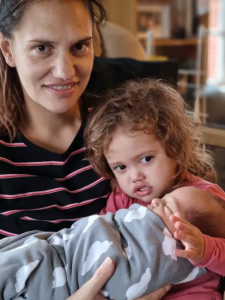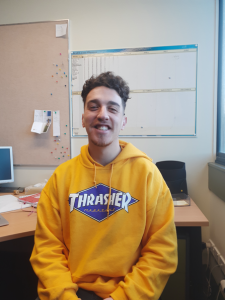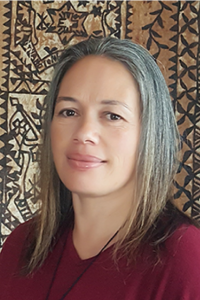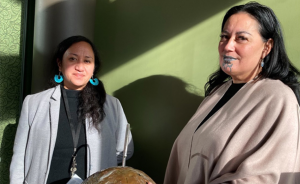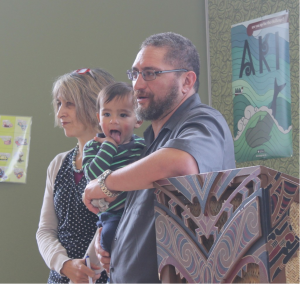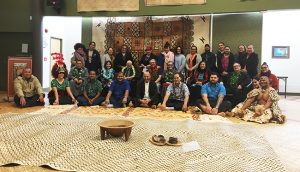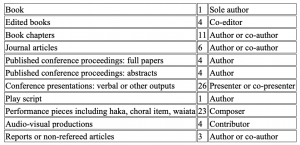What’s been going on?
There haven’t been too many blogs in the last six months but that will change, with more news coming through as it happens. But to clear the decks, this is a roundup of research news since December. As indicated in the last round-up, Te Tumu was going through a lot of changes with a number of staff retiring or heading off to greener pastures. Since then, even more have moved on; with Tangiwai Rewi also leaving to join Poia in Wellington, and take up a role with the Ministry of Education. But we are really happy that Tangiwai and Gianna Leoni are maintaining links with Te Tumu as affiliate researchers.
Lachy Paterson came back from RSL (Research and Study Leave) at the start of June, and Michael Reilly has just started his year of RSL from 1 July. RSL is an opportunity to engage more deeply with research without the usual demands of teaching and administration, although with Covid, any overseas travel is now impossible. We also won’t be seeing Karyn Paringatai for some time as well. Congratulations to Karyn and Neihana on the birth of Mātahi, a little brother for Manuhou. Karyn is enjoying maternity leave at present, and this will be followed by her scheduled RSL.
We have been lucky to have three new academic staff join us, which is helping to fill the gaps left by our departing staff. Paia Taani joined the Māori Studies team at the start of the year, and was joined more recently by Kare Tipa; both are teaching te reo Māori papers. In addition, Emma Powell joined the Indigenous Development team, and among other things, will be teaching the INGS 501, the core paper in the Master of Indigenous Studies programme next year.
In addition, we have four teaching fellows also helping out, and now occupying the second floor: Leighton Williams (MAOR110: Conversational Māori); Kahurangi Tīpene (MAOR208: Ngā Manu Taki); Val Houkamau (MAOR102: Māori Society); as well as Julia Wilson organising the logistics for Te Tumu’s module in POPH192: Population Health.
And to help facilitate our various research projects, Jade Higgan McCaughan is working as a research assistant for Te Tumu staff. Jade is a former MIndS student, and staff are already making bookings to access his time and expertise.
Paia Taani.
Since beginning my lecturing position in January I have been focusing on three main kaupapa; teaching, confirmation and my PhD. The kaupapa for my doctoral research is about tracking intergenerational transmission of te reo Māori within my own whānau. Whānau narratives of their experiences and perspectives of te reo Māori will form the foundation of my thesis to address the question: How can whānau experiences of te reo Māori loss and, where applicable, reclamation, influence future intergenerational transmission of te reo Māori?
My application for a PhD Doctoral Support Grant from Ngā Pae o te Māramatanga was successful and this also includes ongoing support through fortnightly Zoom hui with other postgraduate tauira from around the motu and to listen to guest speakers. During these hui, tauira will have the opportunity to present their research to the group, so I am looking forward to doing this in September. I will also be presenting at Te Wānaka Rakahau – Ākoka/Student Research Symposium which is held at the University of Otago at the end of August.
Paerau Warbrick
Paerau has completed two articles this year. One has just been published in the June 2021 Journal of New Zealand Studies and is called ‘Māori Election Petitions of the 1870s: Microcosms of Dynamic Māori and Pākehā Political Forces’. Click on the link to read it.
The other is called ‘Price of Citizenship for Māori. A matter of historical and legal context’. The article is to appear in a special upcoming edition of the Journal of the Australia and New Zealand Legal History Society which is now called law&history. The focus of the article tracks the legal concept of citizenship for Māori from pre European contact through to the late 1940s.
Currently, Paerau is working on two further articles. One is on the monumental election battles in 1884, 1887 and 1890 over the Eastern Māori seat in Parliament between James Carroll and Wi Pere. Paerau is analysing individual polling booth data to explain the factors of how Carroll managed to unseat Wi Pere in 1887 and maintain the seat in the 1890 election.
The other article is a commentary on New Zealand’s most senior Māori politician, Winston Peters (former deputy PM and long time Māori MP). The article emphasises that Winston Peters must first and foremost be analysed in terms of him being Māori. He is not a person who is to be analysed in terms of him having ‘Māori ancestry’ or ‘Scottish ancestry’. Peters’ world view is totally in line with his Māori world view. And this is the key to understanding the man and his political positions over time.
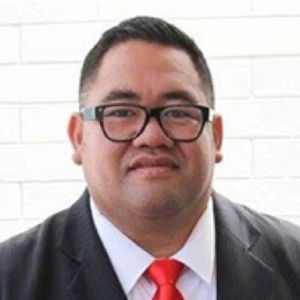 Vaivaimalemalo Michael Ligaliga
Vaivaimalemalo Michael Ligaliga
Michael has been busy recently as Expert Panellist for Royal Commission of Inquiry into Abuse in State and Church Care, Auckland NZ. “I am currently preparing to provide expert advice and on the potential use of indigenous redress practices as a solution to providing closure, voice, reconciliation for victims of abuse. Furthermore, I have been asked to provide a discussion around the advantages and disadvantages of indigenous reconciliation processes such as Samoa’s ifoga, Fiji’s isorosoro, Hawaii’s Hoooponopono, and Tonga’s Fakalelei. How do we apply these reconciliation processes in Aotearoa New Zealand?”
He has also been engaging with the Asia Pacific Institute for Gender-Based Violence (API-GBV) in California, USA. “API-GBV approached me to translate the Power and Control Wheel. The wheel is globally used to identify the different types of violence and abuse. I have been working on translating the Power and Control Wheel into the Samoan language. In addition to this, I have been participating in online zoom listening sessions with GBV and domestic violence service providers, researchers, and government agencies discussing the application of the Power and Control Wheel in the Samoan space. It is intended that after these discussions, a new violence model for Samoan communities will be developed and introduced.”
Lachy Paterson.
The RSL time has been mostly engaged in the Te Hau Kāinga: Māori Home Front project looking at Māori experiences in New Zealand during the Second World War. We have a fairly large team undertaking research, which will eventually end up in a book. Have a look at the “stories” we are posting to our website as we go, which gives a flavour to some of the stuff we are finding out. There are some interesting stories there.
One of the great things about this projects is that we were fortunate to employ six Māori students on Summer scholarships (two of which were part-funded with Humanities Māori Summer Scholarships), supervised by Angela Wanhalla and Miranda Johnson of the History programme, and Erica Newman and myself from Te Tumu. Leighton Williams and Val Houkamau are Te Tumu students; Talia Ellison is a Te Tumu graduate, now doing a Master of Peace and Conflict Studies; Zoe Thomas is majoring in History, with a minor in Indigenous Development; and Bethany Waugh is an Anthropology student. We had one non-Otago student, Rebecca Lee Ammunson from Waikato, studying History, English, and te reo Māori. Check out their projects and research reports.
Part of Angela’s and my work has been to discuss the project and build relationships, and I have met with archivists and librarians at Pukekohe Library, Archives New Zealand, Canterbury Museum, Christchurch City Library and Auckland Museum, Hokianga Museum, Te Ahu (Far North Museum), and the curators of Te Kōngahu Museum of Waitangi and Te Rau Aroha Museum on the Waitangi Treaty Grounds. Angela Wanhalla and I also presented a Zoom seminar on the project to the programme of the La Trobe University History programme, looking at some ongoing aspects of Māori life during the war, namely religious activities, as well as petitions and protests over past grievances.
My other project was to further a book I am writing on a history of Māori-language print culture. I was lucky to be invited to give a key note on Māori-language newspapers to the Bibliographical Society of Australia and New Zealand Conference held in Adelaide late last year. Of course my hopes of being there in person were scuppered by Covid, so instead I gave the talk by Zoom, which was recorded and put on Youtube.
Emma Powell and Kare Tipa were featured in the Uni News. Read about here. Kare has been active in promoting the use of te reo Māori me ōna tikanga, with Hui Whakatau held every Monday morning at 8.30 in Te Tumu. Come along!
Emma Powell
Before beginning in my new role at Te Tumu, my research work was focused on the submission of my PhD. That work – ‘Akapapa‘anga ara tangata: Genealogising the (Cook Islands) Māori imaginary – was a highly abstract and theoretical engagement with the genealogical practices of my people. I described those practices in three modes: cultural practice, cultural paradigm and research method. In those modalities, I then discussed various contemporary political and cultural issues that have surfaced in public discourse over the last decade. Many parts of my PhD have inspired the seeds for new projects that I will begin here at the University of Otago.
The first is a piece of work about the genealogical, cultural and constitutional imbrications of the New Zealand Realm with a particular focus on the Cook Islands. The idea of the New Zealand Realm, with its many (and relatively unresearched) parts, lends itself well to collaborative projects. I recently co-edited an article about the New Zealand Realm and, along with colleagues from the University of Auckland, University of Waikato, Massey University, AUT and Lousiana State University, we have submitted it for publication. I also presented early ideas about the problems of the Realm’s constitutional geography with Miranda Johnson (in the History programme at the University of Otago) at the Empire & Ecologies: Transimperial, transhistorical and transregional natures from the 17th to the 21st century symposium, hosted by University College Dublin.
Alongside teaching in the coming months, I will be working on turning my PhD into a book and hope to organise a workshop where I can invite colleagues and mentors to workshop the manuscript with me. I also look forward to collaborating with Erica Newman on a writing project, and meeting with graduate students and colleagues from the University of Waikato and AUT in preparation for conference season, November to December 2021.
Erica Newman has had two MIndS students successfully complete with distinctions, who will be graduating this year. She reports:
“I gave a presentation for the sixth annual CCARHT (Cambridge Centre for Applied Research in Human Trafficking) Summer Symposium on the 29th June. My presentation was titled ‘Māori patterns of adoption’ where I discussed the differences between whāngai and the introduced European laws of adoption. The latter were established for the adoptive parents, and as the adoptee has no say, and the 1955 Adoption Law severed connections between all parties, this can be seen as a legal practice of trafficking babies. Something that would not happen (that I have not been aware of) within te ao Māori.
“As a result of that symposium I am currently working on an article for the Journal of Modern Slavery. I am also working on several other articles, and blog posts for the Te Hau Kāinga: Māori Home Front project.
“At the moment my main focus is on my Marsden project, and Te Hau Kainga Marsden project. As part of my Marsden I made a trip to Christchurch to Oranga Tamariki Adoption Services head office where I met with a number of Adoption Practice Managers, Practice Leaders, Regional Service Managers, Policy Law/Reform staff and Ministry of Justice Law Adoption Reform team leader. My visit was to introduce myself and my research project and to discuss the effects of the current adoption legislation for descendants of Māori adoptees. This proved to be a very positive meeting which allowed me to gain an insight to their perspectives and to make them aware of issues from a descendant’s point of view. This has given rise to a ongoing relationship, where I now have contacts within the adoption services whom I can contact if I need clarity on anything for myself and for the collaborators on this research project.
“As part of this project, I went to Wellington a couple of weeks ago and had a follow up meeting with Ministry of Justice where we discussed the new Adoption Law Reform Discussion document. This included looking at all the different aspects of the current 1955 Adoption Law and how this could be changed, even discussing whether we needed an adoption law moving forward. They asked me lots of questions from my point of view as a descendant of a Māori adoptee as well as from my research findings.
“Whilst in Wellington I also met with MP Paul Eagle (Labour) who is a Māori adoptee himself and very focused on the law reform. We discussed my research and different aspects of adoption especially for Māori.
“Oranga Tamariki Adoption Services have asked me if I would agree to being interviewed and filmed to discuss my story as a descendant of a Māori adoptee.”
—
Well, that’s all for now. Expect more news soon.
Te Tumu’s First Professor Emeritus
Poia Rewi (Ngāti Manawa, Tūhoe, Te Arawa, Ngāti Whare and Tūwharetoa) was appointed as a Senior Lecturer in Te Tumu, School of Māori, Pacific and Indigenous Studies at the University of Otago in 2003. Previously he had been a Māori Studies academic at the University of Waikato from 1992. In 2016 he was promoted to professor. He ended his service at Te Tumu in mid-2020 in July 2020 when he took up the role of Chief Executive/Tumu Whakarae of Te Mātāwai, a government organisation established under Te Ture mō Te Reo Māori 2016/The Māori Language Act 2016, to foster and support Māori language development for iwi.
Although the honour of professor emeritus is normally awarded to professors retiring from academia, the University’s Policy for the Award of the Title of Emeritus Professor allows the title to be made to a Professor who resigns, for example, to take up a distinguished public position. Poia’s illustrious academic career (discussed below) and his leadership within Te Tumu and the university induced Professor Michael Reilly and other Te Tumu colleagues to seek this honour for our recently departed Dean.
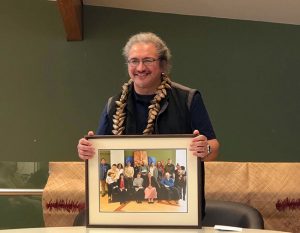
Professor Poia Rewi at his farewell at Te Tumu, 24 June 2020, with a photo featuring his Te Tumu colleagues.
Speaking to the Otago Bulletin Board on Poia’s departure in July last year, Professor Reilly described Poia as a “deeply humble, modest man who believes that it is for others to speak of the kumara’s sweetness.”
“His abiding passion is always first and last, te reo Māori. He advocates for its use by all New Zealanders. In his teaching and writing he always encourages his students and others to seek out and to utilise the rich diversity of language forms that the reo has inherited from the ancestors.”
“In Te Tumu Poia was generous with his time and showed hospitality to all. He became well known for volunteering to work in the kitchen, always concerned to ensure visitors, staff and students had plenty of food; a mark of the true leader, one who always thought of the well-being of others.”
Poia places much value on the importance of teaching the new generation, and work within the community. The growing success of his postgraduate students attests to his influence, and in 2012 he received the Otago University Students’ Association Supervisor of the Year Award. His knowledge of the reo and Māori performing arts resulted in him being appointed a judge at many regional Māori-language speaking competitions as well as being a judge at national, regional and tribal Māori performing arts competitions (adult/senior and high school levels).
Te Reo Māori has always been his passion. In 1997 he received a certificate as a translator and interpreter of te reo Māori from Te Taura Whiri i Te Reo Māori/The Māori Language Commission. This is an exceedingly hard qualification to attain and demonstrates his high level of proficiency in the Māori language. In 2005 Poia completed the first PhD solely in Te Reo Māori at the University of Otago. It was a study of whaikōrero or Māori oratory through the words of a group of some 30 respected elders, many of them highly regarded orators on the marae throughout the country.
Subsequently, he revised and translated the thesis into English for publication as Whaikōrero: The World of Māori Oratory, published by Auckland University Press in 2010. This book was the first major publication to study this major Māori art form. In 2011 it was awarded the New Zealand Society of Authors – E. H. McCormick Best First Book Award for Non-Fiction. Later, it became the basis for a 12 part Māori Television documentary, ‘Whaikōrero’, which won the Broadcasting-Māori medium category in Ngā Tohu Reo Māori 2014/the Māori Language Awards 2014.
As a researcher his dominant focus has been Te Reo Māori and the associated performing arts. As a teacher of the reo to second language learners he has always been interested in the revitalisation of the reo and this became the centre of his research in more recent years. In 2010 he was a lead investigator for two major grants from Ngā Pae o te Māramatanga, a national Centre of Excellence: ‘He Iho Reo, Developing a toolbox to support Māori Language Transmission and Maintenance’ ($226,439), and ‘Te Pae Tawhiti: “Te Kura Roa,”’ a jointly commissioned research project with Rāwinia Higgins of Victoria University of Wellington ($1,500,000). A number of reports and publications were generated from these grants including
- Day, D & Rewi, P., ‘Te Kura Roa wānanga wawata: Inter-department Specific- enablers/inhibitors’, 2013. Twelve individualised reports distributed to each of the 12 participating Government departments, approximately 667 pages.
- Higgins, R., Rewi, P., Olsen–Reeder, V. (eds.), The Value of the Māori Language: Te Hua O Te Reo Māori, Wellington: Huia Publishers, 2014,
- Day, D., Rewi, P. & Higgins, R. (eds.), The Journeys of Besieged Languages, Newcastle upon Tyne, UK: Cambridge Scholars Publishing, 2016.
Further to his academic pursuits, Poia has been a prolific writer of Māori narrative over the years manifesting in published works as haka compositions, waiata, Māori language plays, fiction and nonfiction. This has resulted in several texts published in the Pikihuia short stories series. Poia himself has also adjudicated the Pikihuia Māori writers’ awards for a number of years. His most recent writing accolade was acknowledged in 2020 for a te reo Māori text.
Poia has completed 86 outputs, as shown in the summary on the left.
Poia served as Dean of Te Tumu between 2015 and 2020. Another significant leadership role at Otago was as Associate Dean Māori, Division of Humanities, 2012-2014. He was also Deputy Director of Ngā Pae o te Māramatanga, a national Centre of Research Excellence, between 2018-2020.
His recognition as a leader in the Māori world was evidenced by his service as Acting Chief Executive of Te Taura Whiri i Te Reo Māori/The Māori Language Commission from 2014-2015. He was also a member of the Commission’s Board between 2012-2015. This outstanding service within, but also outside the university, helped pave the way to his new role at Te Mātāwai. Poia was elected in 2021 as a Fellow of the Royal Society of New Zealand Te Apārangi, “celebrated as one of the most active research specialists in Māori culture, language revitalisation, oral history and performing arts.” Yet, due to his modesty, even some of his Te Tumu colleagues had no idea of the extent of his scholarship.
Poia Rewi always said when he first came down to Otago 18 years ago he had only wanted to stay for a few years before heading back up to the North Island. We knew that he was only on loan to us, and it was an honour to have him for the time that that we did. E hoa, me kore ake koe hei ārahi i a mātou, arā, i ō hoa mahi o Te Tumu me te whare wānanga, i te ao Māori kei waho o te whare wānanga, me ngā tini tāngata e kimi ana, e whakaū ana, e whakapiki ana i te reo Māori.
[Thanks to Professor Michael Reilly and Dr Tangiwai Rewi for information for this post.]

